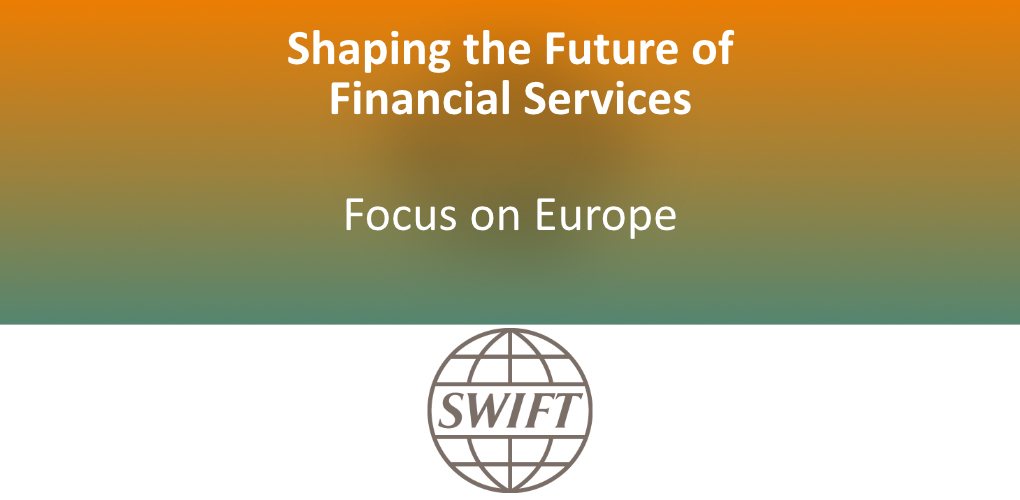
Insights & Opinions
SWIFT Shaping the Future of Financial Services - Focus on Europe
Wed, 25 Nov 2020


Earlier in October, we invited Saskia Devolder for an intimate session to explain all about SWIFT’s new strategy and the development of a platform to shape the future of financial services.
With a focus on Europe, the cooperative invited its stakeholders on November 17 and 18 for a community update, to give more context to its new strategy and more details on its new platform.
A global platform solution to connect local solutions?
Instant payments and open banking determine today’s discussions in the payments industry. Pushed by the regulator, most European countries have adopted both, unfortunately, each with their own, cost-effective solutions.
COVID-19 accelerated the adoption of new digital solutions. No longer were banks pushing it, but customers were asking for it. Axel Weiss, Head of Payments at the German Savings Bank Association, observed that even a cash-dominated market like Germany embraced contactless and digital payments, with consumers in the driver’s seat.
Several discussions on instant payments, with representatives from Germany, France, the Netherlands and Spain proved that instant payment solutions remain locally flavoured, each with their own particularities. German banks mainly provide it as a premium service, Dutch and Spanish banks that see it as a new normal, and France is somewhere in the middle.
There was one constant: a call for more EU-wide reachability of instant payments. The ECB has set out a couple of additional measures with the objective to have all participants over Europe to be reachable across the chain, irrespective of which ACH they are connected to.
The only thing that is currently missing for massive adoption, and to make instant payments a valid solution for Point-of-Sale and e-commerce, is a uniform front-end experience with a sustainable business model. Fabrice Denèle, Senior Vice President, Strategy & Partnership of Natixis Payments, believes that Europe should have at least one common alternative to the international card schemes, with a consistent user experience to provide to its consumers, as a matter of sovereignty.
EPI, the European Payments Initiative, was said to have the support of about 70% of the private payments market and is supported by the ECB. Dimitri Pattyn, Deputy Director-General, Market Infrastructure (MI) and Payments, European Central Bank, argued: “Card payments are the fastest growing payments means. The growth takes place with a multiplicity of domestic schemes and international card schemes on proprietary technologies that are not under EU governance.”
Axel Weiss: “Many banks have the feeling that it is our last chance to create a European alternative to all the international competitors”.
Also, on a global scale, the call for international instant payments is growing, and the industry is getting prepared. With instant and faster payments being a global trend, SWIFT is uniquely positioned to provide a solution. The cooperative has 235 market infrastructures (MI) connected to its network. With 35% of international payments having at least one leg in a domestic payments system, domestic market infrastructures play a key role in achieving instant and frictionless international payments.
Uniform data for better insights across the entire value chain
Data is king, and the industry is far from owning the crown.
Open banking has opened a new set of opportunities, both for consumers and for corporates. Customers expect their bank to offer services that go much broader than payments, and in a consistent way. Mark Buitenhek, Head of Transaction Services, Wholesale Banking at ING witnessed that: “As a bank, you no longer negotiate with the CFO or the treasurer, but you also speak with the digital officer of your customer. They expect a full integration, resulting in a final decision to collaborate being made by the person who is responsible for digital channels.”
Value-added services like liquidity forecasting, supply chain finance, delivering credits to buyers have become more important with COVID-19. By way of example, ING investigated the changed shopping behaviour of consumers to help supermarkets to better understand what was going on. Mark: “It is not just about payments anymore, but it is also about getting better insights on what our clients are actually doing.”
That is why SWIFT puts such an emphasis on ISO 20022. As Stephen Lindsay, Platform Evolution Business Lead at SWIFT said: “ISO 20022 is the central element required for global integration with richer data.”
This requires adoption across the transaction process, end-to-end. This starts already with the corporate. Paula Roels, Head of SWIFT and MI, Cash Management, Deutsche Bank stated that “The biggest benefit is going to be for the corporates, when they start adopting the ISO 20022, both at the point of initiation and even more importantly for reporting. With reporting, we can actually provide them with this rich and structured data, finally addressing the pain point of reconciliation.”
Vincent Brennan, Head of Group Payments & BCM, Bank of Ireland, confirmed this by saying that the adoption of ISO 20022 fact represents an opportunity to standardise while improving data insights.
Driven by MIs, it is believed that by 2025, 80% of global high-value payment volumes will have adopted ISO 20022.
Instant, secure and frictionless
Connectivity, data and instant servicing is what the market demands these days. SWIFT’s strategy aims to make this possible for banks, by making cross-border payments as easy and low-cost as a domestic payment.
“Frictionless and instant is a pleonasm”, said Alain Raes, Chief Business Development Officer at Swift, “if we want instant, we have to remove the friction from the process.”
More than 4,000 financial institutions and 80 market infrastructures around the globe are already making use of SWIFT gpi, with 300 billion USD that is processed over gpi every day. This success has dramatically enhanced the speed, transparency and traceability of cross-border payments.
The insights that SWIFT has gained with the introduction of the unique end-to-end transaction reference (UETR) has enabled a whole new set of improvements towards instant and frictionless payments. SWIFT’s future platform will further build on that. The move towards a transaction management service will ensure accuracy and richer data, end-to-end orchestration and mutualised value-added services.
In the context of (global) instant payments, instant prevalidation is emerging as a value-added service for compliance and fraud. This requires a different approach to execute a payment, away from the sequenced way of working through messaging services. A platform is the only viable way and an essential step in the evolution of fraud detection to real-time fraud prevention.
Fraud prevention requires every participant in the value chain to do their homework on their counterparts. By opening its KYC Registry to corporate customers in December 2019, SWIFT dramatically reduced the KYC burden for corporates. Since then, both corporates and banks have been benefiting from a more streamlined process for KYC information collection. Ecosystem thinking and collaboration are essential in creating the right financial crime compliance and fraud detection procedures because fraudsters need to be right only once, but banks need to be right all the time.
Improved efficiency and flexibility at the customer’s own pace
Common problems require common solutions. This has been SWIFT’s ‘raison d’être’ since the very beginning, and this is what it will keep doing in the future. The existing portfolio of SWIFT services can be mutualised on the platform and building these services in the cloud with API connectivity will allow faster time-to-market at a lower cost.
The new strategy gives members the chance to concentrate more on what they are good at. Whether it is compliance, fraud or cybersecurity, it all takes a lot of effort and skilled labour to adhere to the latest rules. From the moment SWIFT can take over part of this, banks can innovate more on customer-facing services.
SWIFT is committed to leaving none of its customers behind by being ambidextrous, as Simon Torrance, Senior Advisor, Rainmaking, called it, innovating in the existing business while investing in new models. Backward compatibility will allow financial institutions to adopt new services and ways of doing things at their own pace, with some members continuing with messaging and others connecting to the network with APIs, all while ensuring data integrity.
First movers, like Aion bank, know how to get most out of the latest technology and are eager to not be held back by slower adopters, as explained by Krzysztof Hoffman, Head of Payments at Aion: “We need APIs to be more agile in answering regulatory requirements.”
Conclusion
With today’s challenges in the financial world, SWIFT has made an unambiguous statement to transform its business, ready for today’s digital world and the challenges of the future. The ambitions of the platform approach will not only allow existing customers to improve their services and product offerings, but also open doors to new market segments.
The richer data, all available on the platform, along with prevalidation and tighter SLAs for low-value payments will further improve STP and reduce the cost of a transaction, which opens opportunities in the SME and consumer space.
I would like to close this blog with a message from Nick Kerigan, Head of Innovation Execution, SWIFT: “We need to be humble and understand that innovation is happening everywhere. We are happy to work with our customers, the tech giants, the fintechs alike. We have to solve those challenges together.”


